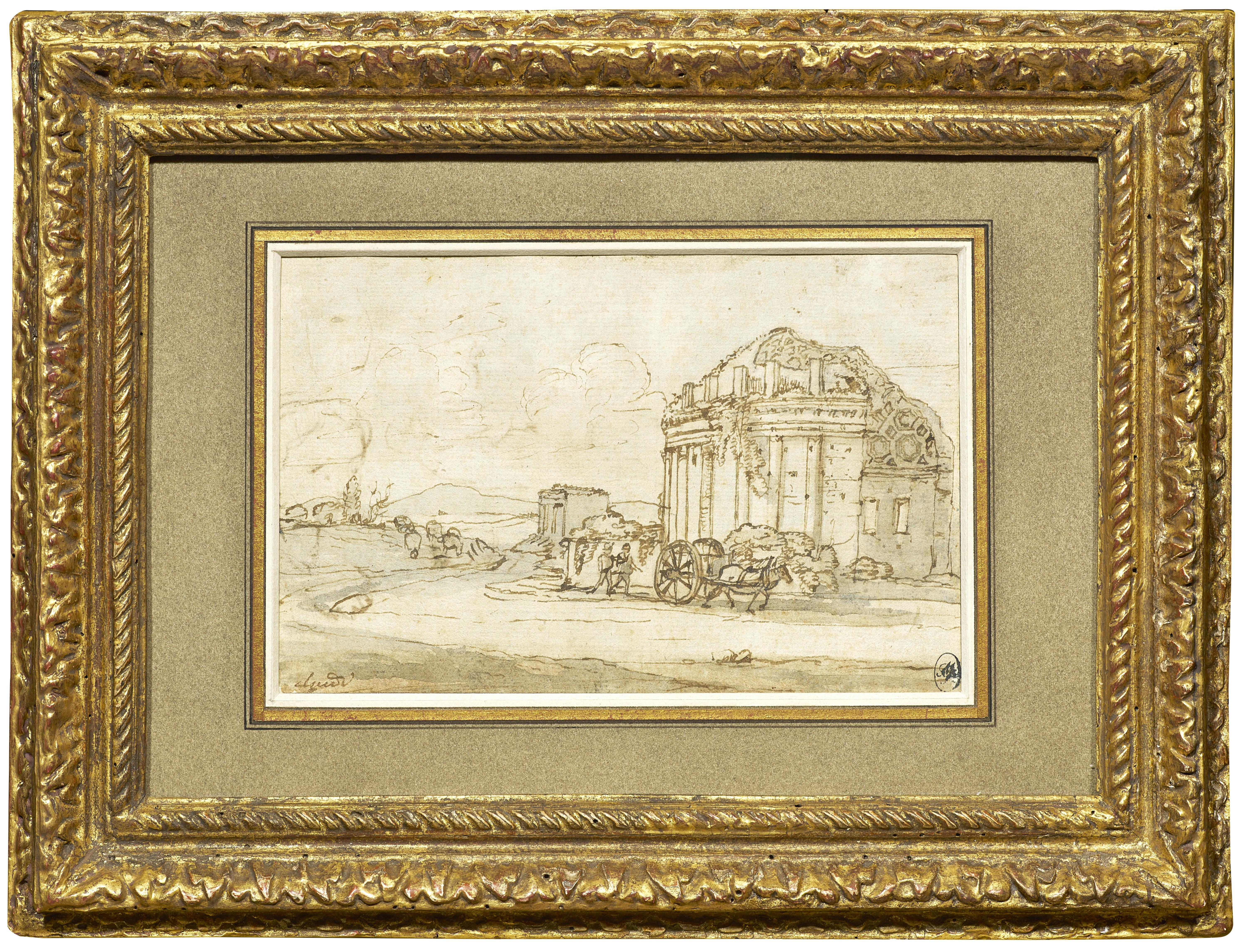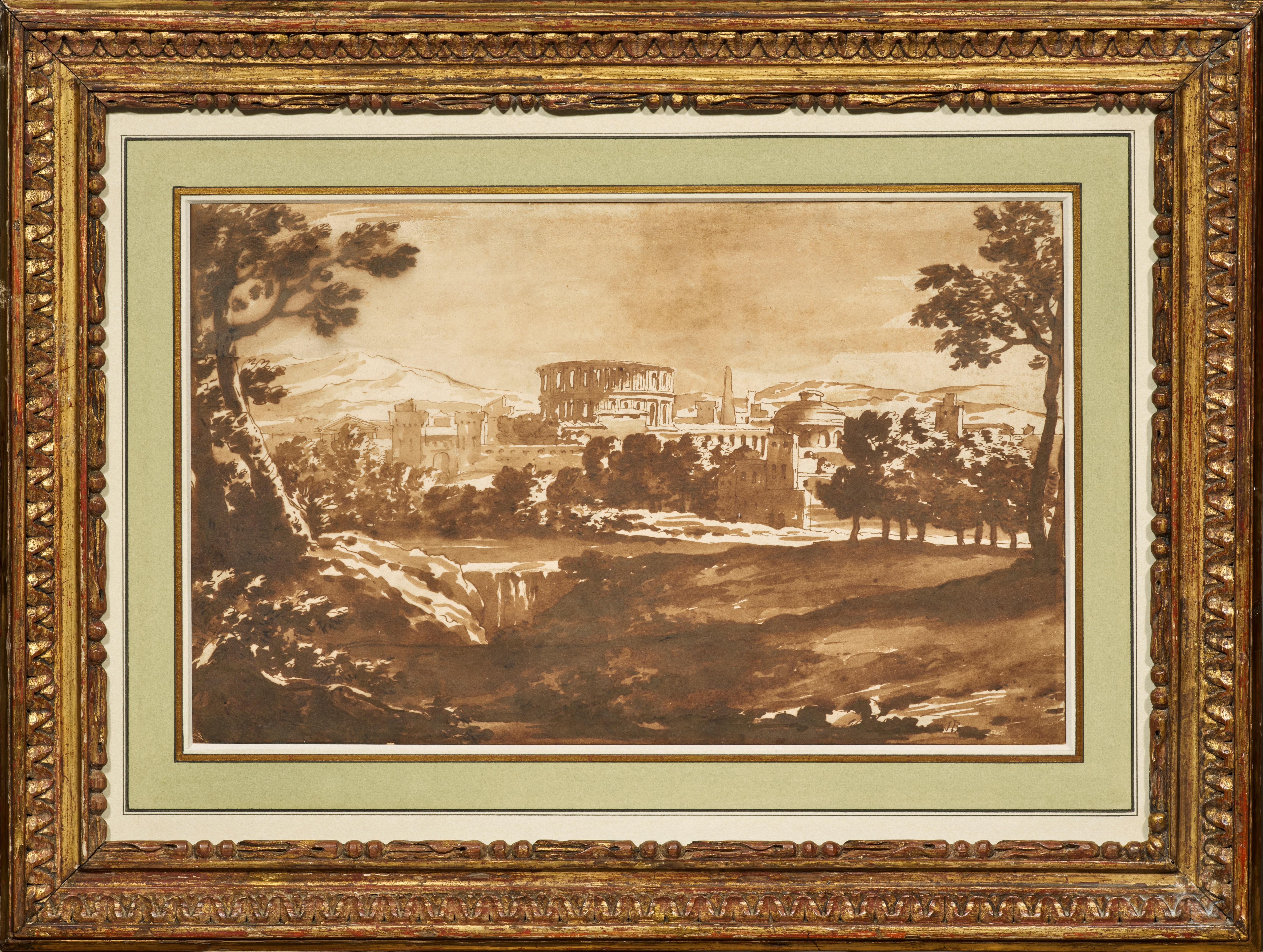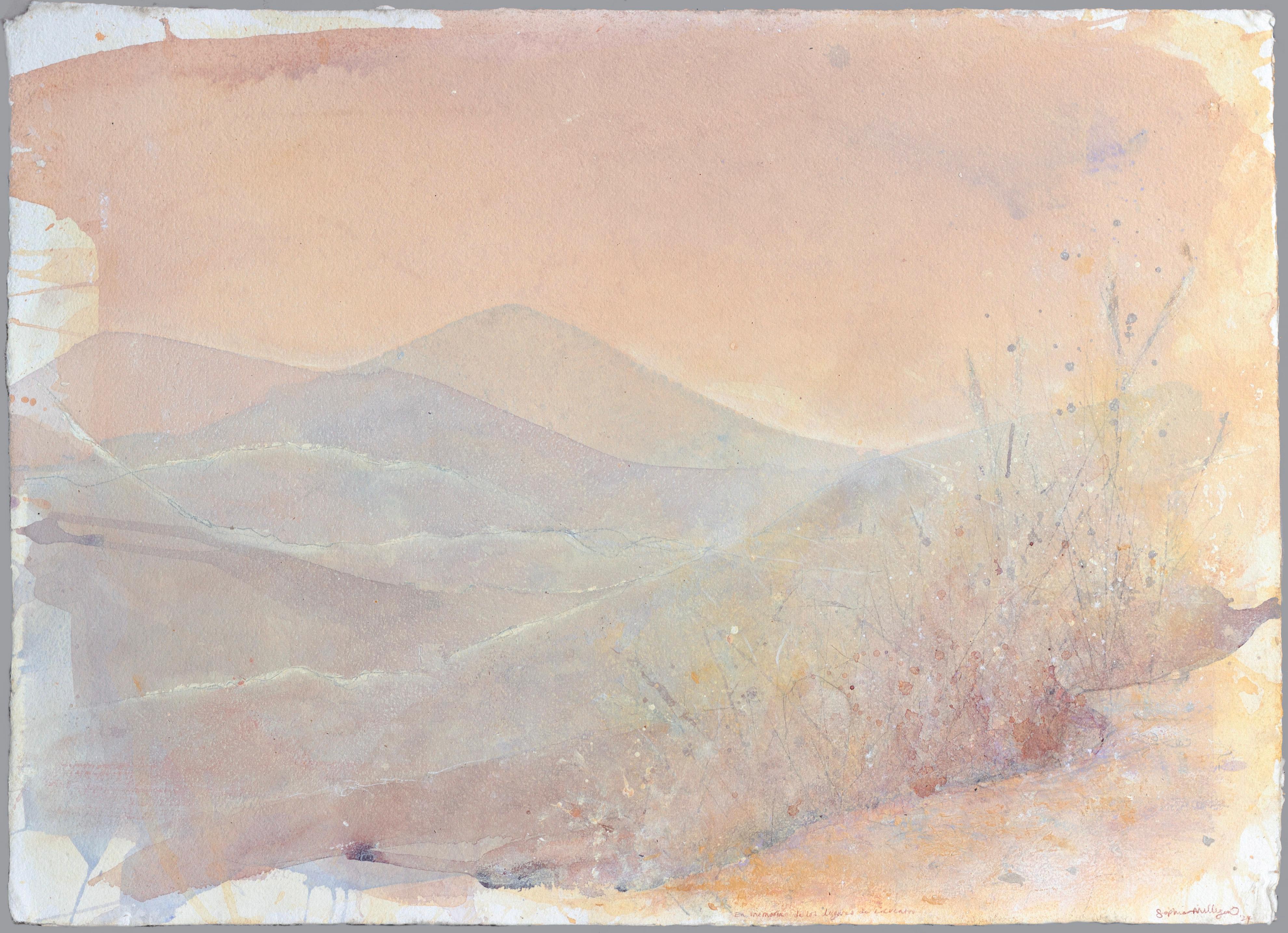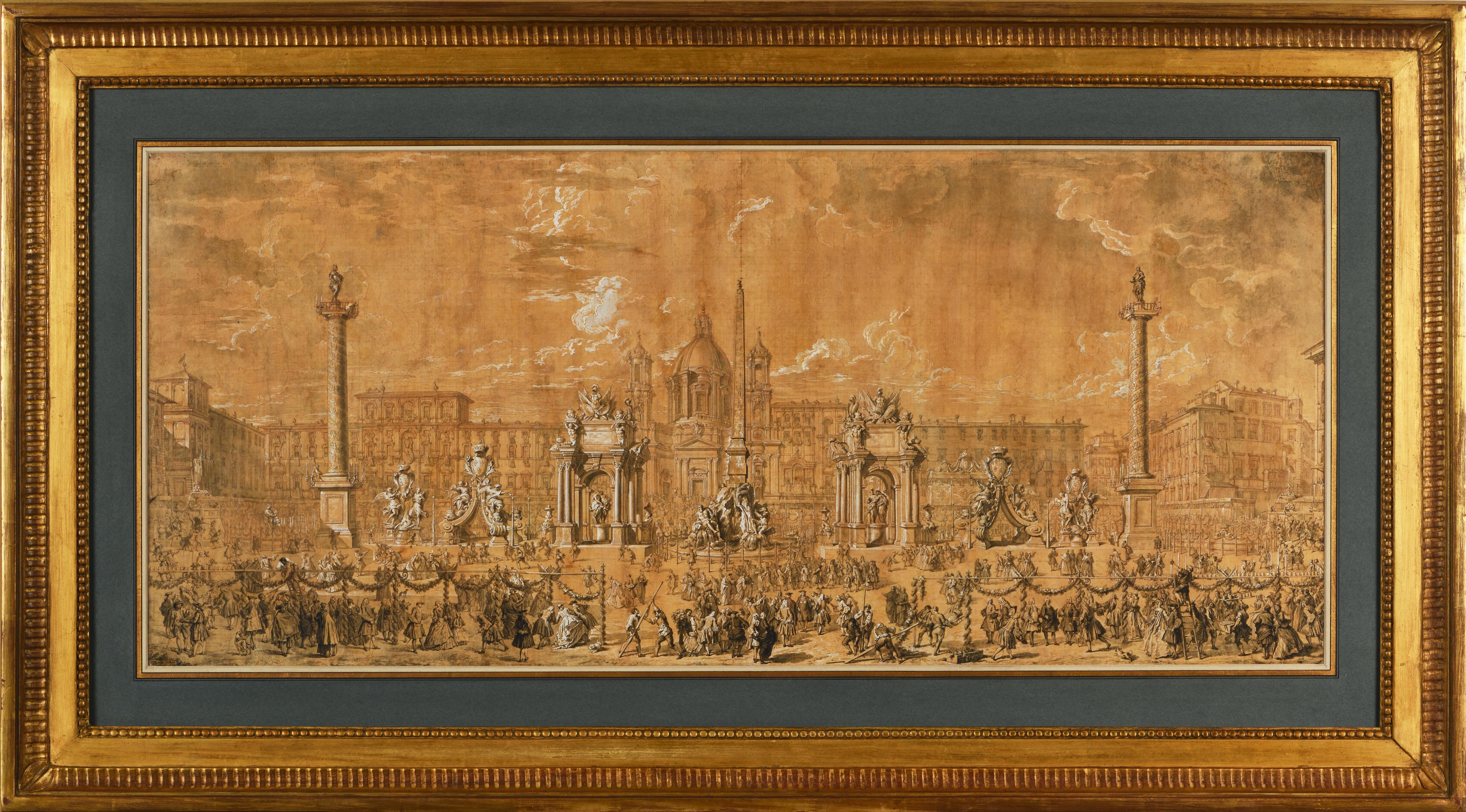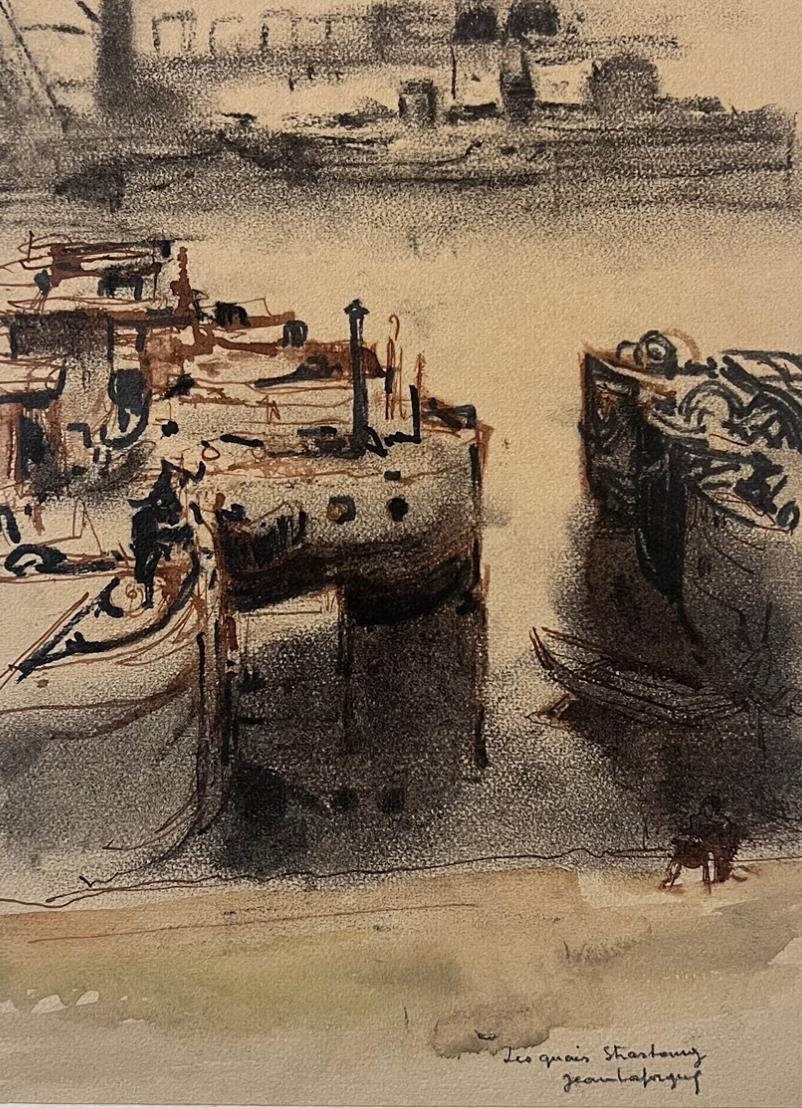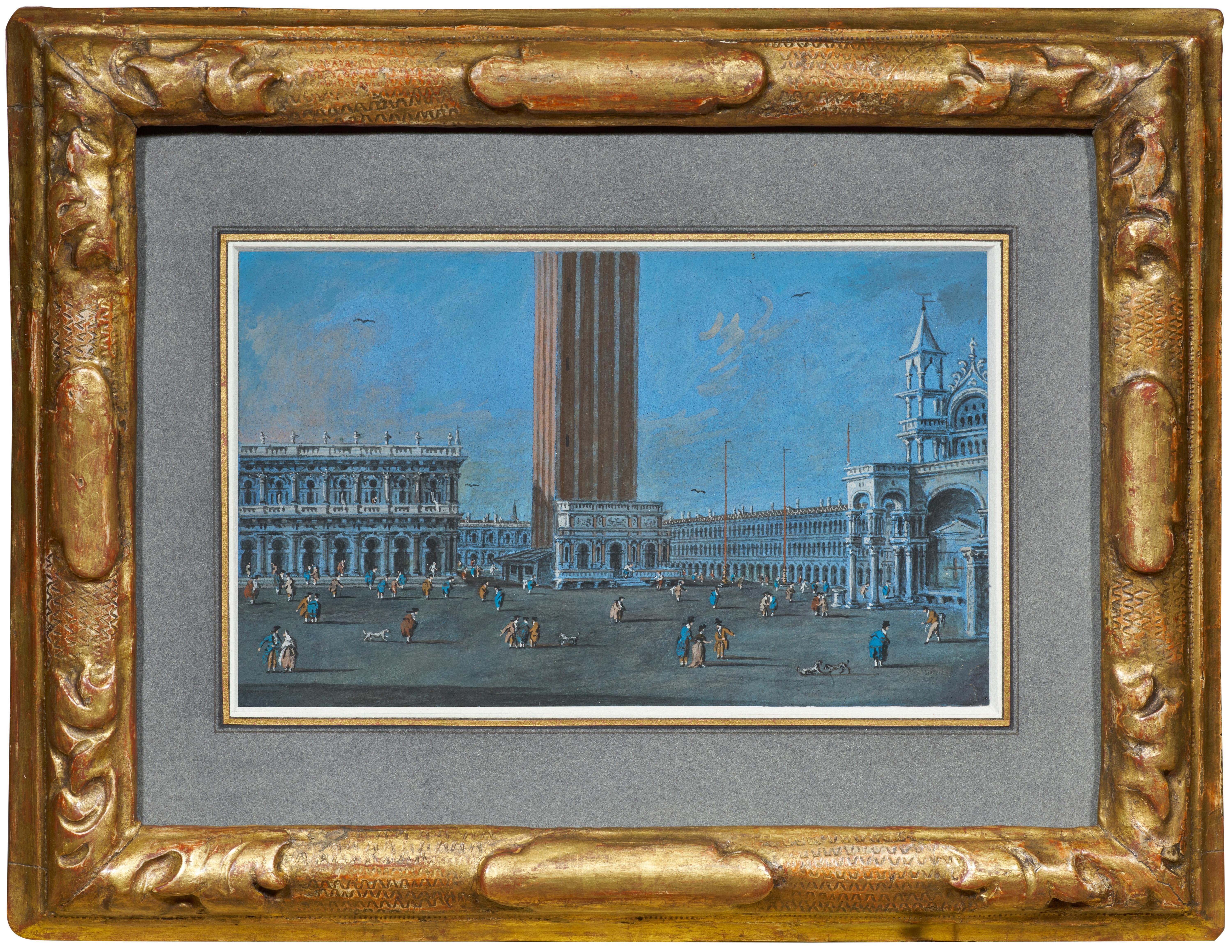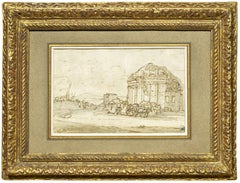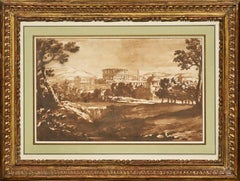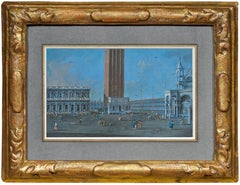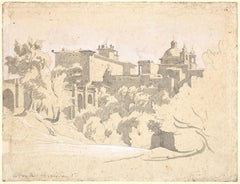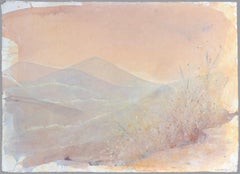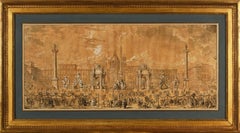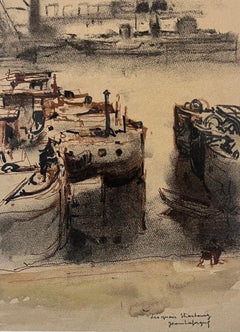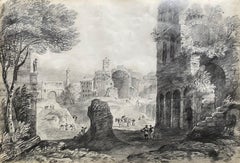Items Similar to Landscape with Trees and a Fisherman walking, a drawing by Jan Van Goyen
Want more images or videos?
Request additional images or videos from the seller
1 of 5
Jan Josefsz Van GoyenLandscape with Trees and a Fisherman walking, a drawing by Jan Van Goyenca. 1650
ca. 1650
About the Item
No Dutch draughtsman ever captured the atmosphere of the rural countryside of Holland with the same atmospheric and engaging simplicity that Van Goyen achieved in drawings such as this. Indeed, his landscapes were seminal in the development of the genre. The present sketch conveys a striking sense of movement within the natural landscape, conveyed by the deftly applied strokes of chalk, from which the artist’s hand can be sensed. The composition is characteristic of his work, with the low horizon affording significance to the broad sky and the soaring birds within. This feeling of windswept motion powerfully evokes the expansive Dutch farmland with which he was evidently preoccupied.
1. Jan van Goyen, a pioneer in Dutch landscape painting
Jan van Goyen was ambitious in his yearning for prosperity and recognition. Son of a cobbler in Leiden, he was apprenticed at the young age of ten to local painters. After a year of travelling through France, Van Goyen's received his formative training from the landscapist Esaias van de Velde in Haarlem in 1617. Haarlem, centre of monochrome still lifes, put Jan van Goyen forward as the first and leading painter of Dutch tonal landscapes.
Eventually, Van Goyen moved to the court city, The Hague, where he became head of the Guild of Saint Luke. Regardless his substantial artistic output, Van Goyen was also active (although not very successful) as an art collector, dealer, auctioneer, appraiser, tulip and real estate investor. Surrounded by artists, he let the adjoining house to acclaimed fellow landscapist Paulus Potter. Two of Van Goyen's daughters married respectively his student, the genre painter Jan Steen and still life painter Jacques de Claeuw. Van Goyen's portrait by acclaimed colleague Gerard ter Borch confirms his prominent position among the Dutch artworld elite.
Van Goyen travelled the length and breadth of the Netherlands recording details of landscape and topography in black chalk. A small sketchbook tucked into his pocket, the draughtsman in search of inspiration could quickly delineate sand dunes and architectural structures in the vicinity of his hometown or accompany him on extended journeys. Back in his studio, the sketches would provide endless inspiration, combining different motifs into imaginary landscape compositions. These drawings not only functioned as preliminary studies for motifs in paintings, Van Goyen at times also reworked them into larger, more finished drawings, typically monogrammed and dated, and intended for sale. Never attempting to depict accurate views, Van Goyen's preliminary studies unfold as topographical elements in his composite landscapes.
His graphic work was inventoried by Beck in 1972 and included several hundred drawings; more than a thousand have been recorded today. Almost exclusively executed in black chalk at the beginning, these drawings were enriched from the end of the 1640s onwards with a light wash of grey or brown ink, like the one presented here.
2. Description of the artwork
A group of trees along a river, a fisherman walking with his dog, a fishing rod on his shoulder, the description of this landscape seems banal. But the atmospheric rendering is the real subject here: the immense sky shaded by discreet lines of black chalk in which a few birds fly, the dunes where the play of light and wind creates deep contrasts between areas of shadow and full clarity (rendered by a masterful use of reserves).
Despite its small size and the fact that it was taken from life, the extreme composition of our drawing must be emphasised. Our landscape is organised around a diagonal running from the lower left to the upper right, following the edge of the mound at the bottom left and the tree tops in the middle of the composition. There is a strong contrast between the movement of the trees and the direction taken by the fisherman and its dog, and the flight of birds in the sky in the opposite direction.
Van Goyen's technique is remarkable for its skill and precision: with a comma or a loop he brings a character to life, and a touch of wash is enough to convey the atmosphere. Our drawing has not been listed by Beck, but in the supplement to the catalogue raisonné published in 1987 (under number 409) there is a composition with broad similarities.
3. Framing
We have chosen to frame this drawing in a Dutch ebony veneer frame which brings out the grey range in which our landscape develops (with some imperceptible touches of brown in the foliage of the trees).
Main bibliographic sources :
Hans-Ulrich Beck - Jan van Goyen 1596 - 1656. Ein Oeuvreverzeichnis - Van Gendt & Co. Amsterdam 1972 - Ergänzungen zum Katalog - Davaco 1987
(collective) - Regards sur l'art hollandais du XVIIème siècle - Fondation Custodia 2004
- Creator:Jan Josefsz Van Goyen (1596 - 1656, Dutch)
- Creation Year:ca. 1650
- Dimensions:Height: 3.63 in (9.23 cm)Width: 5.63 in (14.31 cm)
- Medium:
- Movement & Style:
- Period:1650-1659
- Condition:Dimensions : 3 5/8’’x 5 5/8’’ (92 x 142 mm) ; framed : 9 7/8’’x 12 1/8’’ (25 x 30.8 cm) This drawing is presented in a Dutch ebony veneer frame. Provenance: Alfred Brod Gallery, London; English private collection since 1965.
- Gallery Location:PARIS, FR
- Reference Number:1stDibs: LU1568211234292
About the Seller
5.0
Vetted Professional Seller
Every seller passes strict standards for authenticity and reliability
Established in 2020
1stDibs seller since 2021
9 sales on 1stDibs
- ShippingRetrieving quote...Shipping from: PARIS, France
- Return Policy
Authenticity Guarantee
In the unlikely event there’s an issue with an item’s authenticity, contact us within 1 year for a full refund. DetailsMoney-Back Guarantee
If your item is not as described, is damaged in transit, or does not arrive, contact us within 7 days for a full refund. Details24-Hour Cancellation
You have a 24-hour grace period in which to reconsider your purchase, with no questions asked.Vetted Professional Sellers
Our world-class sellers must adhere to strict standards for service and quality, maintaining the integrity of our listings.Price-Match Guarantee
If you find that a seller listed the same item for a lower price elsewhere, we’ll match it.Trusted Global Delivery
Our best-in-class carrier network provides specialized shipping options worldwide, including custom delivery.More From This Seller
View AllA landscape drawing by Claude Lorrain, with a preliminary sketch on the verso
By Claude Lorrain
Located in PARIS, FR
This study presents a typical Roman countryside landscape: an ancient mausoleum in front of which a cart is passing by followed by two peasants. If the technique (a pen drawing on graphite lines, completed with a wash of brown and grey inks) and the signature inevitably evoke the art of Lorrain, we find on the verso of this drawing additional evidences that lead us to consider this unpublished drawing as a work by the master.
The motif of the mausoleum has been taken up in pen on the verso in a technique that can be found in several other drawings by Lorrain. There is also a study of three characters, which can be considered as preparatory to Lorrain’s painting entitled The Port of Ostia with the Embarkation of Saint Paula, leading us to claim this attribution with a dating of around 1639.
1. Claude Lorrain or the perfection of classical landscape in Rome in the 17th century
Claude Gellée was born in 1600 in Chamagne in Lorraine. Orphaned at the age of twelve, he spent a year with his brother in Freiburg, where the latter was a woodcarver. Claude Gellée then probably arrived in Rome in 1613, where he joined the workshop of Agostino Tassi (1580 - 1644) in 1617. Between 1619 and 1620 he studied for two years in Naples in the workshop of Goffredi Wals (who was himself a former pupil of Tassi).
In 1625 he returned to Lorraine for two years where he worked alongside Claude Deruet. He then returned to Rome, a city he never left for the rest of his life (except for short trips to the surrounding countryside).
From 1627 to 1650 he lived in Via Margutta. From 1635 onwards he became a renowned painter and commissions started to pour in. Considered during his lifetime as the most accomplished of the classical landscape painters, his reputation never faded.
Between 1629 and 1635 Le Lorrain often went to the Roman countryside to draw with his friend Joachim von Sandrart (1606 - 1686). He became a member of the Academy of Saint Luke in 1633, while being closely acquainted with the Bentvueghels, this guild which brought together the young Nordic painters active in Rome. In 1643 he joined the Congregation of the Virtuosi. In 1650 he moved to Via Paolina where he lived until his death.
Little is known of his intimate life. He seems to have had a daughter, Agnes, from an ancillary love affair. In 1657/ 1658 she moved in with him. Stricken with gout in 1663, he died in 1682.
2. Description of the drawing; the technique of nature studies
Two peasants are walking behind a horse-drawn cart on a road that winds through ancient tombs. While a rectangular tomb with a columned facade can be seen in the distance, the cart passes an important ancient building. It has a circular shape and its partially ruined façade is decorated with columns. The start of a second floor can...
Category
1630s Old Masters Landscape Drawings and Watercolors
Materials
Ink, Pen, Graphite
View of an Antique City, a wash landscape by Jan de Bisschop (1628 - 1671)
Located in PARIS, FR
The attribution to Jan de Bisschop has been confirmed by the RKD with the following comment: "We base this attribution on the dark washes, the subject represented and the monogram".
...
Category
17th Century Old Masters Landscape Drawings and Watercolors
Materials
Ink, Pen
View of Piazza San Marco, a tempera signed by Giacomo Guardi (1764 - 1835)
Located in PARIS, FR
Signed and localized on the verso :
"Vedute di parte dalla Piazza dif.a alla Loggetta e cam
panil parte della Zecca ed in lontan Proc.e vechie e parte della chiesa
punto preso vic...
Category
Early 19th Century Old Masters Landscape Drawings and Watercolors
Materials
Tempera
View of Ariccia, a preparatory drawing by Achille Bénouville (1815 - 1891)
Located in PARIS, FR
This very modern drawing presents a view of Ariccia, a small town 25 kilometres south-east of Rome. The Palazzo Chigi (in which the film-maker Luchino Visconti would film a large part of The Leopard a century later) and the adjoining church are seen from the bottom of the ravine that surrounds the town. This drawing is a moving testimony to the attraction of the city for artists of the Romantic period, who established in Ariccia a vivid artists' colony.
1. Achille Bénouville...
Category
1850s Romantic Landscape Drawings and Watercolors
Materials
Ink, Gouache, Pencil
Study for « Paysage de Fribourg » - 1943 a drawing by Balthus (1908 - 2001)
By Balthus (Balthasar Klossowski de Rola)
Located in PARIS, FR
Provenance: Frédérique Tison, Château de Chassy (Burgundy-Franche Comté - France)
Bibliography: J. Clair, V. Monnier Balthus, catalogue raisonné of the complete works, Gallimard, Pa...
Category
1940s Modern Landscape Drawings and Watercolors
Materials
Pencil, Paper
View of the Ovo Castle in the Moonlight, a 19th century Neapolitan gouache
Located in PARIS, FR
Neapolitan gouaches appeared in the eighteenth century when tourism in the Naples area was developing: the discoveries of Herculaneum and Pompeii made this city a mandatory stop on the Grand Tour, the journey made by wealthy Europeans to complete their education.
Generally small in size for ease of transport and affordable in price, these gouaches were the ideal travel souvenir that these tourists of the early days were bringing back to capture the idyllic landscapes they had discovered during their journey and to share them with family and friends upon their return at home.
The Bay of Naples and the eruptions of Vesuvius are the favourite themes of these views. Here we have a view of the Ovo Castle, which was rebuilt on the island of Partenope, in the middle of the Bay of Naples and about a hundred metres from the shore by the Normans in the 12th century on antique ruins...
Category
Early 19th Century Romantic Landscape Drawings and Watercolors
Materials
Paper, Gouache
You May Also Like
'Lugar de Encuentro' Mountains landscape painting neutral earth natural pastel
By Sophia Milligan
Located in Penzance, GB
'Lugar de Encuentro (Montes de Malaga)'
Original Artwork. Unframed
______________
The evening light is creating layered lines and meeting places in the mountains, that only exist in...
Category
2010s Naturalistic Landscape Drawings and Watercolors
Materials
Paper, Conté, Mixed Media, Pencil, Carbon Pencil, Ink, Acrylic
Preparations for the fireworks display held in Piazza Navona in 1729
Located in Paris, Île-de-France
VERY IMPORTANT DRAWING BY
JACQUES DUMONT called « LE ROMAIN"
(Paris 1701-1781)
Preparations for the fireworks display held in Piazza Navona in Rome on November 30,
1729, for the bi...
Category
1730s French School Landscape Drawings and Watercolors
Materials
Chalk, Ink, Pen
Mid 20th Century French Signed Painting Dark Boats At The Dock
Located in Cirencester, Gloucestershire
Jean La Forgue (French 1901-1975) signed watercolour, ink and chalk on paper, mounted in a card frame
inscribed verso
card frame: 16 x 12.5 inches
painting: 12 x 9.5 inches
provenanc...
Category
Mid-20th Century Post-Impressionist Landscape Paintings
Materials
Watercolor, Chalk, Ink
18th C Italian Classical Grand Tour Ancient City Old Ruins & Figures
Located in Cirencester, Gloucestershire
Title: The Italian City
Artist/ School: English/ Italian School, late 18th century; a Grand Tour work.
Medium: pencil drawing.
Size: 6.75 x 9.75 inches
Provenance: from a priva...
Category
Late 18th Century Old Masters Landscape Drawings and Watercolors
Materials
Pencil
Abstract Landscape, Surrealist Gouache Painting by Yohanan Simon 1962
By Yohanan Simon
Located in Long Island City, NY
Artist: Yohanan Simon (1905-1976)
Title: Landscape
Medium: Gouache on paper laid to card
Date: 1962
Signature: Signed and dated in Hebrew
Paper Size: 16.75 x 21 inches
Frame Size: 24...
Category
1960s Modern Landscape Paintings
Materials
Gouache, Laid Paper
$6,000 Sale Price
20% Off
Boat at the Dock, Alviso Bay Area Tonalist Landscape Watercolor by Iku Nagai
By Iku Nagai
Located in Soquel, CA
Boat at the Dock, Alviso Bay Area Tonalist Landscape Watercolor by Iku Nagai
Lovely Tonalist watercolor landscape of Alviso, California by Iku K. Nagai (Japanese/American, b. 1932)....
Category
1980s Tonalist Landscape Paintings
Materials
Laid Paper, Watercolor
Recently Viewed
View AllMore Ways To Browse
Large Landscape Drawing
Architectural Drawing Study
Architectural Studies Drawings
French Master Drawings
Drawings By Old Masters
Antique Architectural Drawings
Architecture Hand Drawings
Walking On Light
Old Master Drawings Framed
French Old Master Landscape
Old French Sketch
Large Painting Monochrome Painting
Architectural Drawings Renderings
Tulip Drawing
French Fisherman
Old Master Dog
Bird Dog Painting
Portrait Fisherman
